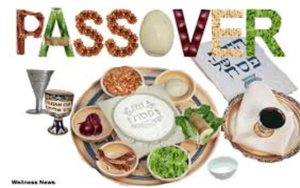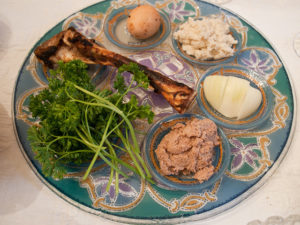Passover: A Spiritual Feast For Our Five Senses

The best way to learn about Judaism, and to absorb the plethora of knowledge into our psyche, is to engage all five senses—sight, sound, smell, taste, touch. And no holiday does this better than Passover, the most celebrated Jewish ritual at home. Obviously, the sages made provisions for our spiritual sustenance thousands of years before sensory learning became a thing. The Passover seder engages all our sensory needs, which makes this holiday a favorite among young and old and its lessons so timeless. Just as the sound of the shofar awakens our soul on Rosh Hashanah, the upbeat music of Dayanu livens the story of our journey from slavery to freedom. When we stimulate our senses, the lessons of our ancestors are engrained in our memories so that we pass our traditions down from one generation to the next, L’dor vador.
Matzo– The Bread of Freedom, Affliction (And Addiction?)
I could eat matzo all year round (then again I love kefilte fish). And don’t get me started on Manischewitz Tam Tams, those irresistible snack crackers I used to munch right out of the box when I snuck into my grandparent’s pantry as a kid. Even when the cardboard box is left open for days, Tam Tams taste as good stale as they do fresh.
Matzo, or matzah, or matzot (plural), is a crisp unleavened flatbread that leaves crumbs all over the kitchen counter, and yet when covered with a silk embroidered cloth this flavorless cracker becomes the centerpiece of our Passover seder table. Matzo, while the perfect accompaniment to everything from chopped liver to egg salad, helps us tell the story of our exodus from Egypt, in Hebrew Mitzraim. Unleavened bread was one of the foods the Jews in Egypt were commanded to eat along with the paschal lamb. We eat matzo to commemorate the time when the Israelites were forced to escape Egypt in a hurry in the middle of the night and did not have time to allow their bread to rise. More on the meaning of matzo HERE. We eat matzo on the first and second night at the seder and refrain from eating bread the rest of the week, whether we eat matzo or not. For me, this seven-day Passover holiday, also called Pesach, is an excuse to spread soft butter on matzo as a snack and try new recipes, whether it’s matzo pizza, lasagna, kugel, or granola.  When I was in Weber Elementary School and my classmates gathered for lunch in the cafeteria, my non-Jewish friends wanted to trade their bologna on white bread  for my peanut butter and jelly matzo sandwiches, but I never fell for it, even when tempted with a Twinkie.  Back in the day, my favorite way to eat matzo was when my mom would soften a sheet in water, crumble into pieces, soak in egg, shape into patties, and fry in butter and oil until crisp golden brown on the outside and chewy on the inside. I gobbled them up right out of the sizzling fry pan, drizzled in honey or syrup. We called them matzo pancakes, also known as matzo brei, and still remains a cherished childhood memory. Continue reading
Why I Celebrated 2 Passover Seders—in 1 Night
Jewish holidays, from Hanukkah to Purim, give us another opportunity to grow spiritually, and thankfully there’s a reason to celebrate all year round. Passover, which begins this Friday night March 30 and lasts for one week, is certainly no exception. What makes Passover, also called Pesach or Festival of Freedom, so special is that all generations come together to participate in this ritual ceremonious meal called the Seder (means “order or arrangement”) in which we read the Hagaddah (means”retelling”) of the action-packed story of the Israelites journey from slavery to freedom.
The Haggadah begins, “All who are hungry, come and eat; all who are needy come and celebrate Passover.”  Come to find out, it is ME who feels like the stranger in my own religion, hungry for knowledge and wanting more from this holy experience when Jews all over the world celebrate the the Hebrews becoming their own nation thousands of years ago. I’m grateful to our family and friends for hosting the Seders all these years, allowing me to indulge a little more into the meaning of it all without the stress of plating sliced carrots atop gefitle fish for dozens of guests and then cleaning all the dirty dishes. Continue reading



